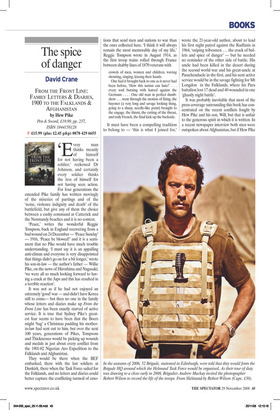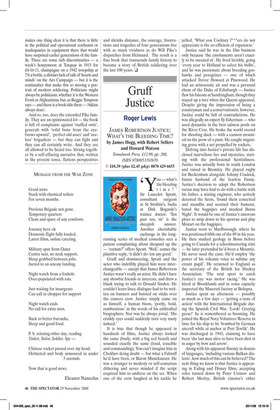The spice of danger
David Crane
FROM THE FRONT LINE: FAMILY LETTERS & DIARIES, 1900 TO THE FALKLANDS & AFGHANISTAN by Hew Pike Pen & Sword, £19.99, pp. 237, ISBN 1844158128 ✆ £15.99 (plus £2.45 p&p) 0870 429 6655 ‘Every man thinks meanly of himself for not having been a soldier,’ reckoned Dr Johnson, and certainly every soldier thinks the less of himself for not having seen action. For four generations the extended Pike family has written movingly of the miseries of partings and of the ‘noise, violence indignity and death’ of the battlefield, but give any of them the choice between a cushy command at Catterick and the Normandy beaches and it is no contest.
‘Peace,’ writes the wonderful Reggie Tompson, back in England recovering from a bad wound on 24 December — ‘Peace Sunday’ — 1916, ‘Peace be blowed!’ and it is a sentiment that no Pike would have much trouble understanding. ‘I must say it is an appalling anti-climax and everyone is very disappointed that things didn’t go on for a bit longer,’ wrote his son-in-law — the author’s father — Willie Pike, on the news of Hiroshima and Nagasaki; ‘we were all so much looking forward to having a crack at the Japs and this has resulted in a terrible reaction’.
It was not as if he had not enjoyed an extremely ‘good’ war — and didn’t have Korea still to come— but then no one in the family whose letters and diaries make up From the Front Line has been exactly starved of active service. It is true that Sydney Pike’s greatest fear seems to have been that the Boers might ‘bag’ a Christmas pudding his motherin-law had sent out to him, but over the next 100 years, generations of Pikes, Tompsons and Thicknesses would be picking up wounds and medals in just about every conflict from the 1901-02 Nigerian Aro Expedition to the Falklands and Afghanistan.
They would be there when the BEF embarked, there with the last soldiers at Dunkirk, there when the Task Force sailed for the Falklands, and no letters and diaries could better capture the conflicting turmoil of emo tions that send men and nations to war than the ones collected here. ‘I think it will always remain the most memorable day of my life,’ Reggie Tompson wrote in August 1914, as the first troop trains rolled through France between shabby lines of 1870 veterans with
crowds of men, women and children, waving shouting, singing, kissing their hands.
One had it brought back to one as it never had been before, ‘How this nation can hate!’ . . . every soul burning with hatred against the Germans . . . . One old man in perfect dumbshow . . . went through the motion of firing, the bayonet (a very long and savage looking thing, going to a sharp, needle-like point) brought to the engage, the thrust, the cutting of the throat, and truly French, the final kick up the backside.
It must have been a compelling tradition to belong to — ‘this is what I joined for,’ wrote the 21-year-old author, about to lead his first night patrol against the Radfanis in 1964, ‘sniping tribesmen . . . the crack of bullets and spice of danger’ — but he needed no reminder of the other side of battle. His uncle had been killed in the desert during the second world war and his great-uncle at Passchendaele in the first, and his next active service would be in the savage fighting for Mt Longdon in the Falklands, where his Para battalion lost 17 dead and 40 wounded in one ‘ghastly night battle’.
It was probably inevitable that most of the press coverage surrounding this book has concentrated on the recent conflicts fought by Hew Pike and his son, Will, but that is unfair to the generous spirit in which it is written. In a recent newspaper interview both men were outspoken about Afghanistan, but if Hew Pike makes one thing clear it is that there is little in the political and operational confusion or inadequacies in equipment there that would have surprised earlier generations of the family. There are some rich discontinuities — a week’s honeymoon at Torquay in 1915 for £4-16-11, champagne on a 1942 troopship at 7/6 a bottle, a distinct lack of talk of ‘hearts and minds’ on the Aro Campaign — but it is the continuities that make this so moving a portrait of modern soldiering. Politicians might always be politicians, whether it is the Western Front or Afghanistan, but, as Reggie Tompson says — and there is a book title there — ‘Atkins always does’.
And so, too, does the extended Pike family. They are an opinionated lot — the book is full of complaints against ‘stuffed owls’, generals with ‘solid bone from the eyebrows upward’, ‘perfect old asses’ and ‘useless’ brigadiers — but they can fight and they can all certainly write. And they are all allowed to be heard too. Strung together by a self-effacing narrative that, written in the present tense, flattens perspectives and shrinks distance, the courage, frustrations and tragedies of four generations live with as much vividness as do Will Pike’s dispatches from Helmand. The result is a fine book that transcends family history to become a story of British soldiering over the last 100 years. q



































































































 Previous page
Previous page